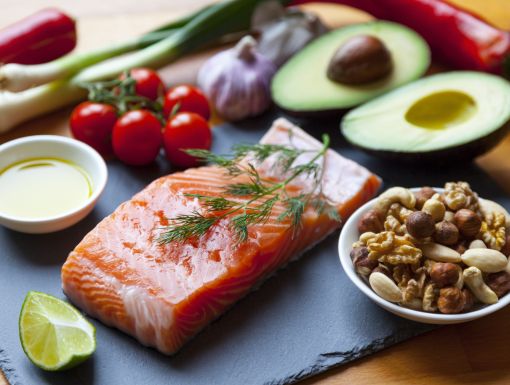
Green Mediterranean Diet: What Are the Benefits?
Most have heard of the Mediterranean diet, which is based on the traditional cuisine of countries bordering the Mediterranean Sea. The Mediterranean diet has proven benefits on cardiovascular disease outcomes. For five consecutive years, the Mediterranean diet has been ranked as the No. 1 “Best Diet Overall” by U.S. News & World Report.
In addition to the overall best diet, in 2022, U.S. News & World Report ranked the Mediterranean Diet No. 1 in “Best Plant-based Diets,” “Best Heart-Healthy Diets,” “Best Diabetes Diets,” “Best Diet for Healthy Eating” and “Easiest Diets to Follow.”
The green Mediterranean diet is a healthier take on this already healthy diet known to reduce the risk of heart disease, stroke, diabetes, obesity, and certain cancers. The major difference between the two diets is the green Mediterranean diet cuts out red meat completely, focusing on plant-based proteins, such as nuts, seeds, legumes and soy-based foods. Adding in fish and seafood twice a week, along with moderate amounts of dairy, eggs and poultry. The green Mediterranean diet also suggest minimizing processed foods and added sugars.
Polyphenols are anti-inflammatory and antioxidant properties that offer protection from cancer, diabetes, aging, hypertension, asthma, cardiovascular disease and infections. They are found in plant matter and the plant-based foods encouraged in the green Mediterranean diet.
A study found that those who increased their intake of plant-based and protein-rich foods combined with refraining from eating meat, may further reduce their cardiovascular risks. It has also been found that the green Mediterranean diet can help more significantly decrease LDL cholesterol (or bad cholesterol), diastolic blood pressure and inflammation.
What to eat on the Green Mediterranean Diet?
| The Green Mediterranean Diet | The Mediterranean Diet | ||
| Eat | Non-starchy vegetables, leafy greens, fruit, Greek yogurt, walnuts, plant-based fats, olive oil, tahini, herbs, spices, green tea and Mankai duckweed | Eat | Vegetables, fruit, nuts, seeds, legumes, potatoes, whole grains, herbs, spices, extra virgin olive oil, fish and seafood |
| Eat in Moderation | Fish, seafood, poultry, dairy, and eggs | Eat in Moderation | Poultry, eggs, cheese and yogurt |
| Avoid | Red meat, processed meat, highly processed foods, desserts, soda and all other sweetened beverages | Eat on occasion or rarely | Red meat, sugar-sweetened beverages, added sugars, processed meat, refined grains, refined oils and processed foods |
While following the green Mediterranean diet, aim to have fish or seafood twice a week, and you should avoid red meat, processed foods and sweets. Similar to the Mediterranean diet, if you enjoy alcohol with your meal, one glass of red wine per day is still allowed on the diet.
The green Mediterranean diet also encourages three to four ounces of green tea, one ounce of walnuts and 100 grams of Mankai duckweed daily. Mankai duckweed is a plant known as water lentils and is protein-rich with iron and B-12. It can be purchased in powder form or in frozen cubes and can be used in smoothies. Mankai duckweed isn’t commonly known and may be difficult to find at your local grocery. Hemp, chia or flax seeds can be used as a substitute.
If you are looking for a way to boost your nutrient intake, the green Mediterranean diet and the Mediterranean diet may be ways that can help you take care of your body by eating more vegetables, fruit and whole grains.
As with any diet or meal plan, the green Mediterranean diet and the Mediterranean diet may not be for everyone. By following either diet, you are consuming more nuts and olive oil, which are healthful fats. It may be a good idea to avoid the diets if you are supposed to limit fat intake. Lower levels of iron and calcium may result from following the green plan. The best thing to do is to consult your physician before starting a diet to see if it’s the best meal plan for your body and overall health. If you don’t know where to begin with making changes to your diet, schedule an appointment with a registered dietitian.
Schedule an appointment and learn more about Lauren Hulin.

